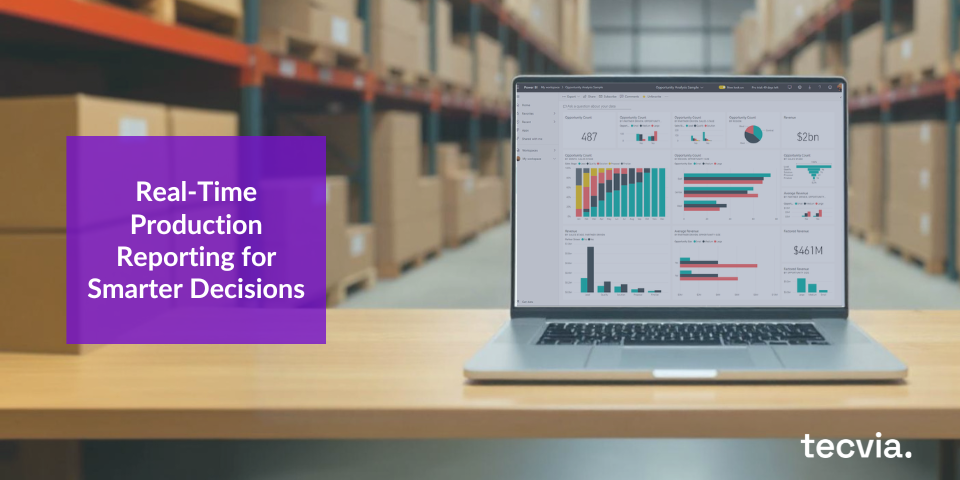Manufacturing moves fast. Rules change faster.
Every day brings new regulations from government bodies, industry watchdogs, and international organisations. Worker safety protocols shift. Product quality standards get stricter. Environmental requirements multiply.
You can’t ignore them. The cost is too high.
Break the rules and face crushing fines. Lose valuable contracts. Watch production lines grind to a halt.
Small and mid-sized manufacturers feel this pressure most. You’re juggling multiple regulations with limited resources. Every new standard adds another layer of complexity to your operations.
Microsoft Dynamics 365 Business Central changes this game.
Business Central brings your entire operation into one system. Sales, finance, inventory, production – everything connects. No more jumping between different platforms to track compliance.
The real power lies in how it handles regulations. Business Central doesn’t just store compliance data. It actively helps you stay ahead of requirements.
Here are 10 ways Business Central transforms compliance from a burden into a competitive advantage.
1. Centralises All Your Records
Business Central brings all your important business information into one system. This includes:
- Purchase and sales orders
- Supplier certificates
- Quality test results
- Product batch numbers
- Equipment inspection records
Having everything in one place means you can find what you need quickly, share it easily, and always have an up-to-date view of your operations. It also makes it much easier to prepare for audits and inspections.
2. Improves Product Traceability
In many industries, such as food, pharmaceuticals, or electronics, you must be able to trace every product from raw material to finished goods, and sometimes even after the product has been sold.
With Business Central, you can:
- Track the source of all raw materials
- Follow each product through the entire production process
- Record lot and serial numbers
- Identify where finished products have been sent
If there’s ever a product recall or a customer complaint, you can quickly trace the issue back to its source and act. This shows that your business is in control and following proper procedures.
3. Supports Quality Control and Testing
Quality control is not only about making great products—it’s also often a legal requirement. Industry standards and safety laws often require that you test products at different stages.
Business Central lets you:
- Set up quality control steps during production
- Record results from product tests and inspections
- Trigger alerts if something fails or is out of tolerance
- Track corrective actions
You can build quality directly into your workflow. This demonstrates to regulators and customers that you take quality seriously and have systems in place to manage it effectively.
4. Manages Health and Safety Compliance
Workplace safety is another key area where manufacturers must follow strict rules. This includes machine checks, employee training, safety reports, and proper handling of dangerous materials.
Business Central helps you:
- Schedule and track regular equipment checks
- Record safety incidents and near misses
- Log staff safety training and certifications
- Set reminders for health and safety tasks
Keeping this information organised helps protect your workers and helps you stay compliant with laws like COSHH, HSE guidelines, and other local safety rules.
5. Helps You Meet Environmental Rules
More than ever, manufacturers are being asked to reduce their impact on the environment. This includes how you handle waste, how much energy you use, and how you manage emissions.
Business Central can track:
- Waste and recycling activities
- Emissions and carbon footprint
- Energy use across different sites
- Compliance with green standards like ISO 14001
Having these records ready makes it easier to report to environmental agencies or apply for sustainability certifications.
6. Automates Regulatory Reporting
When it’s time to file reports with a government agency, industry group, or customer, the last thing you want is to hunt for data across multiple systems.
Business Central makes reporting easier by:
- Pulling real-time data directly from your operations
- Creating reports for production, quality, finance, and more
- Ensuring reports are accurate and up-to-date
- Reducing the chance of mistakes caused by manual entry
This helps you meet reporting deadlines with confidence and frees up your team to focus on higher-value work.
7. Keeps You Ready for Audits and Inspections
Audits can be stressful, especially if you’re not prepared. Whether it’s a scheduled inspection or a surprise visit, having everything in order makes a huge difference.
With Business Central:
- All compliance records are easy to access
- You can show full traceability from material to product
- Reports are ready to be shared with inspectors
- You can provide secure, temporary access to auditors if needed
Being audit-ready shows professionalism and builds trust with regulators, customers, and partners.
8. Supports Industry-Specific Requirements
Different industries have different rules. For example, the medical sector might require sterile environments, while the food industry needs to follow hygiene standards like HACCP.
Business Central is flexible and can be tailored to match your industry needs. You can:
- Set up custom workflows for inspections, approvals, and reviews
- Attach certifications to suppliers or products
- Create checklists for regulated processes
This helps ensure that you meet the unique requirements of your sector, whether it’s ISO, FDA, CE, or another standard.
9. Gives You Control Over Supplier Compliance
Staying compliant doesn’t just mean following your own rules—you also need to make sure your suppliers are following theirs. Poor supplier compliance can create big risks for your business.
With Business Central, you can:
- Record supplier certifications and expiry dates
- Track supplier performance (on-time delivery, quality, etc.)
- Get alerts when documents are missing or out of date
- Choose approved vendors who meet your standards
This helps reduce risk and keeps your supply chain strong and compliant.
10. Keeps You Up to Date as Regulations Change
Laws and standards change often. What was acceptable last year might not be good enough now. Business Central can help you stay informed and adapt quickly.
You can:
- Set up workflows to update policies when rules change
- Get alerts when compliance tasks are due
- Adjust production processes without disrupting the business
- Integrate with other tools or data sources for up-to-date regulation info
This makes your company more flexible and prepared for whatever changes come next.
Final Thoughts
Compliance isn’t just about ticking boxes; it’s about protecting your people, your reputation, and your future. With the growing number of rules in manufacturing, it’s more important than ever to have a smart system that helps you stay ahead.
Microsoft Dynamics 365 Business Central gives manufacturers the tools they need to stay compliant with less stress. It keeps your records organised. It tracks quality and safety. It simplifies reporting. It helps you prepare for audits. All of this is done through a single system.
By using Business Central, you can spend less time worrying about paperwork and more time building great products, keeping your team safe, and growing your business.


